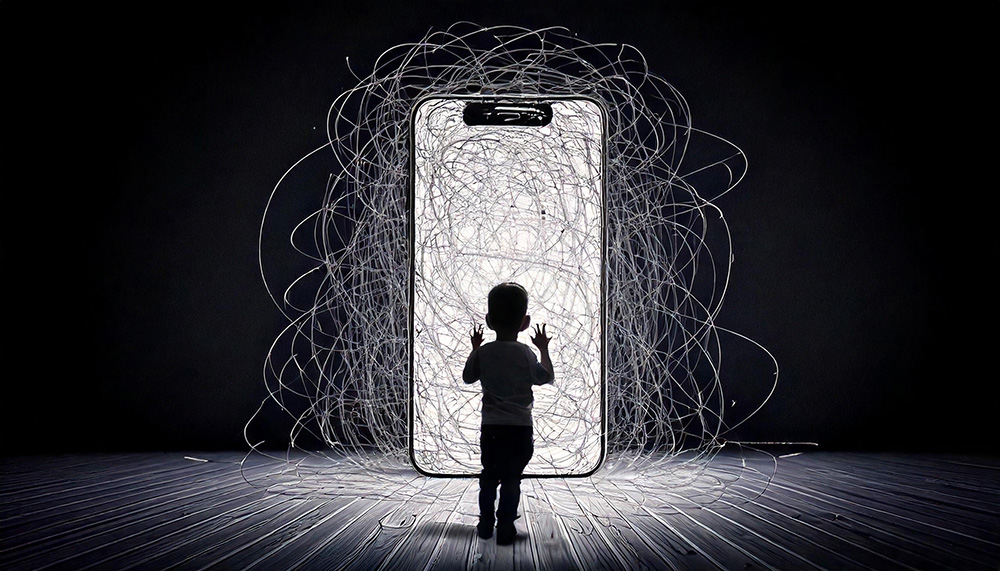The impact of smartphones on children and youth is very real – young Christians in the digial space can encounter the same, if not more challenges, online.
According to a Research Briefing from the House of Commons on the impact of smartphones and social media on children, nine in 10 children own a mobile phone by the time they reach the age of 11 and almost three-quarters of teenagers between age 13 and 17 have encountered one or more potential harms online. The impact of smartphones on children can be extremely damaging (and adults as well).
Many people don’t think twice about owning a smartphone if they are fortunate enough to have the money to do so. Many parents often don’t think twice about giving their children a smartphone from the age of 11 (or younger). There are some more shocking statistics mentioned by Smartphone Free Childhood on smartphone usage.
The impact of smartphones on children and youth: Navigating technology as a Christian parent – balancing faith with digital time and exposure
As Christian parents, introducing smartphones to children and youth presents unique challenges. We strive to instill values of moderation and mindfulness, yet the allure of technology is ever-present. Reflecting on Proverbs 22:6, ‘Train up a child in the way he should go,’ we aim to guide our children in making wise choices. Sharing personal stories, many parents find it difficult to set boundaries without feeling overly restrictive.
However, by fostering open communication and setting clear expectations, we can help our children navigate the digital world responsibly, but it isn’t always easy with the influences of the world around us pushing and pulling in all sorts of directions.
While smartphones offer educational benefits, they also pose risks of distraction and overuse. As with most parents, Christian parents encounter the same challenges, grappling with the decision of when to introduce these devices, weighing the positives against potential drawbacks.
By prioritizing the traditional family time together and encouraging offline activities, this can perhaps help mitigate at least some of the challenges, while keeping the ever critical lines of communication open and available as children and youth navigate friendships, communcation and online content.
Smartphones open up a whole world – not that much of it is really good or wholesome when you think about it
- Games can be addictive or spark private friendships in an unreal, disconnected environment
- Adverts and information can be targetted to appeal directly to a vulnerability whatever that vulnerability is – addiction, self-image, anxiety etc
- Algorithms can serve bad content to those that shouldn’t ever be seeing it, and can also serve content based on the users’ input – for example, a child only has to make up a date of birth that makes them over 18 to join some adult websites and they will see content that they should NEVER be able to get access to.
- False information and lies can influence children and young adults who may well believe a video is real, or a news item is real.
- Smartphones potentially have multiple private ways to commuicate, including one-to-one. While this can be helpful seomtimes, it can also be very dangerous especially if the lines of real-life communication are cut.
These are just a few of the potential difficulties that smartphones can introduce. Below, we have listed some deeper thoughts regarding the disadvantages and some positives with regards to smartphones.
Should you get your child a smartphone?
Negative: Less 'Real Life' Communication
Smartphones can be addictive and children are vulnerable with less self-awareness and the ability to discern what is good and what is not. Further to that, they are less able to understand what is real and what is fake. As smartphones get ‘smarter’ these issues and the dangers for children will only increase. Proverbs 13:20 says “He who walks with the wise grows wise, but a companion of fools suffers harm.”
Negative: Distraction and Overuse
Smartphones can become a significant distraction for children, leading to reduced attention spans and potential addiction. Proverbs 22:3 says “The prudent sees danger and hides himself, but the simple go on and suffer for it”
Negative: Unfiltered / fake / psychological / bullying and damaging content and marketing
One of the most potentially damaging things about smartphones is the potential unfiltered content that pushes lifestyles, issues over self-image, diet, what is or is not ‘normal’ or wrong, and then there is bullying and pronography as well as news, fake news all potentially completely unfiltered. Any one of these (and there are many more besides) can seriously harm a child and a child’s mind and health. Philippians 4:8 says to focus on whatever is noble, right, and pure.
Negative: So many children and teens do have phones
Your child might feel excluded if they don’t have the latest smartphone. In addition, you have no real control over other children showing your child damaging, worrying and scary content. The main defence for this is to regularly educate a child about the dangers of smartphones and how they are used, and to encourage and help them understand why it is better for children not to use phones and they should not assume that any content is real, genuine or good. Additionally, wherever possible, to live by example being mindful of not being on your phone around children. Proverbs 14:5 says “An honest witness does not deceive, but a false witness pours out lies.”
Negative: Expensive!
Smartphones – particularly the latest smartphones – are expensive, even if the cost is split up over many months. Perhaps at least some of that money could go into educational opportunities or music lessons or trips out – or anything that doesn’t involve a screen! Proverbs 21:20 says “A wise man saves for the future, but the foolish man spends whatever he gets.”
Positive: Enhanced Communication
Smartphones can facilitate better communication between parents and children, allowing for constant contact, tracking and peace of mind. This is probably thought of as the most important benefit for parents. Proverbs 15:23 highlights the joy of a timely word, emphasizing the importance of communication.
Positive: You can buy 'dumb phones' to allow your child to communicate with you
One of the safest ways you can use for a child if they really need a phone to communicate with you is to buy a so-called ‘dumb’ phone. These phones can only be used to make voice calls and are stripped down with few other features. They provide a great alternative to smartphones for children and teens if you must have a way to communicate with them when they are away from home. Proverbs 4:23 says “Above all else, guard your heart, for everything you do flows from it.”
Positive: Some tools and phones are available to block and filter content
It is possible to get apps or even a phone ‘hardwired’ in order to block the worst content from reaching a child so they can still have a smartphone. However, that doesn’t stop a child from being shown content from a friends phone and other circumstances out of your control. There is no guarantee that all unhealthy content will be blocked until such time as you choose to unlock it. Unfortunately, the only way to maximise reduction of exposure to digital content on phones is to ban them. 1 Corinthians 6:12 reminds us that while all things are permissible, not all things are beneficial.
Positive: Educational Tools
Smartphones can provide access to educational apps and resources that can enhance learning outside the classroom. This is useful, but there are many other ways to provide access to educational material such as on a locked-down tablet at home, books borrowed from the library or perhaps textbooks and exercise books. Proverbs 22:6 says “Train up a child in the way he should go; even when he is old he will not depart from it”.
The impact of smartphones on children and youth – It isn’t always obvious
A smartphone is capable of drawing a child in over a short or longer period of time, potentially cutting off the family communication lines because the smartphone can draw them in to a closed digital world and away from real life around them. This in turn can ultimately lead to many issues including anxiety, loneliness, misinformation, false and fake information and much worse – the list is long.
Channel 4 aired a two-part documentary called Swiped: The School That Banned Smartphones examining the effects of smartphones on young children by asking for volunteers to allow them to take away their smartphones for two weeks to see how it would affect them. We must warn you that there are some real stories that are upsetting featured in the documentary series, but it does highlight the potential dangers and terrible consequences that smartphones can cause.
Prayerfully keeping up and facing the challenges
It is likely to be a difficult issue as children get older into their teens and it is important to work with them rather than against them. Continual prayer at all stages of life is critical as well as keeping communication and reassurance open in the way that you deal with this topic. Even if your child does not posess a smartphone, they will be very likely at some point to see content via friends and others who already have smartphones and may need help dealing with what they are exposed to. When this happens, how, as parents, you deal with the situation needs Godly wisdom for wise words in conversations.
As Christian parents, the capabilities of smartphones can present a challenge since there are so many apps, so many options, so many settings for each app and the phone itself. Yes, there are parental controls, and security controls, but even some these require quite a lot of technical knowledge – which is difficult for a time-poor busy parent. It is important to try to understand the technology as much as possible (if you don’t already!) and work alongside your children in educating them about online dangers and perhaps the reasons why they might not yet be allowed to have access in the same way that others do at school.
How can I help my family navigate the digital landscape?
- Perhaps you have been thinking about and praying about the use of technology in your home and the challenges of balancing time spent on tech?
- Perhaps you’ve been challenged by the stories of others and their struggles with understanding and controlling the influence of tech and the information it gives access to?
- Maybe you’ve been thinking that it’s time to prioritize meaningful connections over screen time in a new way?
Let’s take a look at just one initiative in the UK that might be able to help
For this article, we have chosen to focus on the Smartphone Free Childhood initiative that falls under our ‘all that’s good in the world’ category from a Christian perspective. Smartphone Free Childhood is a great UK secular initiative trying to make a difference in an ever more intrusive digital world. The initiative offers a supportive community for parents navigating the complexities of introducing smartphones to children. It provides resources and guidance to help make informed decisions.
Joining this initiative connects you with like-minded individuals who value a balanced approach to technology. It promotes healthier communication habits and encourages children to engage in more meaningful, offline interactions.
Smartphone Free Childhood provides help with many of the issues we have mentioned above. There are resources and insights that aim to help support a balanced approach to technology use in your home. Above all, it offers a way to unite with others in seeking better solutions and limitations – particularly for children – to the increasing issues and challenges created by the continually evolving digital landscape including AI and, in particular, smartphones. We think it is a great idea because it also encourages a community sense of parents supporting each other locally with the challenges that smartphone technology brings.
The Smartphone Free Childhood movement began in February 2024
In case it is helpful, we’ve included below a video from not long after the movemenrt started where they spoke to world-renowned Social Psychologist and author of “The Anxious Generation”, Jonathan Haidt. Together they talk about future direction, and what parents, schools, government and tech companies might need to do to reverse the mental health epidemic that is affecting young people across the globe. During the video Jonathan shares data from his new book, and gave his insights.
If you know of any other initiatives, charities or information that could be helpful to anyone trying to find out more about how to navigate smartphones usage with your family, please do send us a message. This is an important subject, not just for Christians, but anyone who is serious about helping children and young adults find a safe and encouraging way through the online world.
Click on a link for further reading and information around this subject…(opens in a new window)
Channel 4 – Swiped: The School That Banned Smartphones Watch a two-part shocking documentary on the affects of smartphones on young children.
The Gospel Coalition – Should Christian Parents Ever Give Kids a Smartphone?
Christianity Today – The Spiritual Battle of Teen Screen Time
Focus on the Family – When Should Your Child Get a Cellphone?
Christianity Today – The Church Can Help End the Phone-Based Childhood
The Good Phone Foundation – Kids shouldn’t have smartphones. Here’s why…
Guardian Newspaper – ‘It went nuts’: Thousands join UK parents calling for smartphone-free childhood
Internet Matters – A smartphone-free childhood? Phone safety tips
Please note that UK Christian Web does not accept paid-for article content – we share information we consider to be important, encouraging and helpful for the benefit of anyone who might read it. This article is part of our ‘all that’s good in the world’ section – showcasing wholesome content from the secular world that could be of benefit to anyone.

AI generated image




